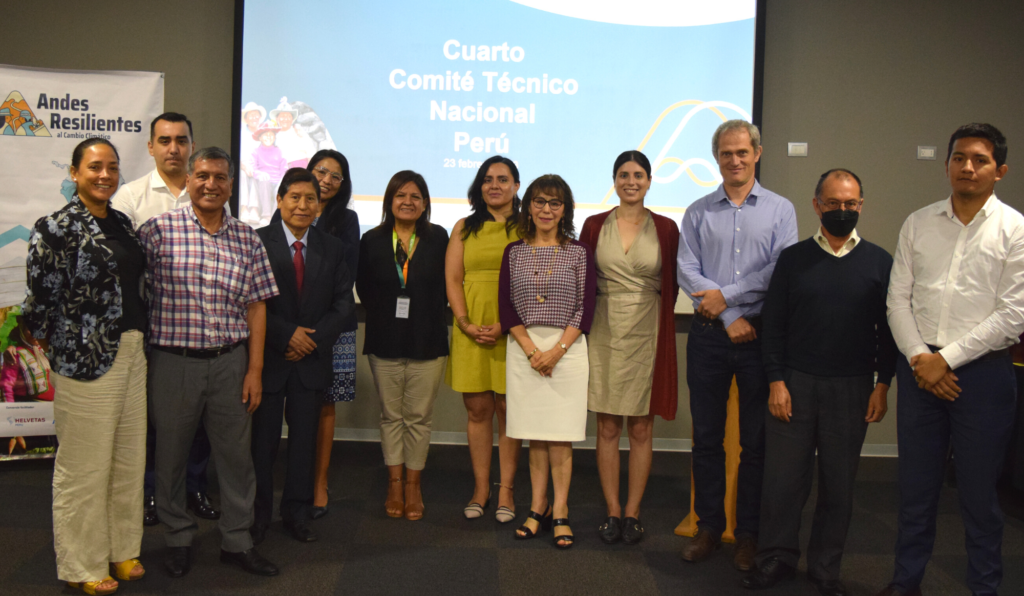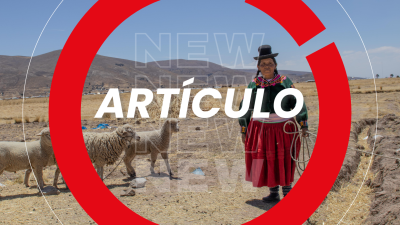Between February and March 2023, National Technical Committees were held in Bolivia, Ecuador, and Peru; countries where the Andes Resilient to Climate Change project has activities in response to strategic demands of national entities that ensure climate change adaptation of the most vulnerable Andean family farming.
The Resilient Andes project works with the key sectors of agriculture and rural development, environment and water, and social inclusion in Bolivia, Ecuador, and Peru. To ensure that the actions promoted by the project are coordinated and promote collaboration between sectors, National Technical Committees (CTN) were created from the project start of the in 2020, as a space for decision-making on the project’s actions in each country.

“The National Technical Committees are a space for coordination with key sectors to address climate change vulnerable family farming. It helps us to build a view that articulates priority actions in the area.”
Karina Salinas, Director in charge of Adaptation at the Ministry of Environment, Water and Ecologic Transition (Ministerio de Ambiente, Agua y Transición Ecológica, MAATE) and Coordinator of the National Technical Committee in Ecuador
The Committees are held every six months, and attendees inform on the activities and products of the previous year, socialise, approve the planning of annual activities, and seek to approve the annual regional activities. A highlight of the 2023 editions of these Committees is that the three countries highlighted the opportunity for Resilient Andes to strengthen the coordination between sectors and levels in order to implement climate action in the territories, and that once the health emergency related to COVID-19 has passed, more frequent face-to-face coordination spaces are available.

©Andes Resilient to Climate Change project
Representatives from the Directorate of Adaptation to Climate Change of the Ministry of Environment, Water and Ecological Transition (MAATE), the Directorate of Analysis and Intersectoral Coordination for Family Farming, the Directorate of Alternative Sales Management, as well as the Vice-Ministry of Rural Development of the Ministry of Agriculture and Livestock (Ministerio de Agricultura y Ganadería, MAG) and the Undersecretariat of Entrepreneurship and Knowledge Management of the Ministry of Economic and Social Inclusion (Ministerio de Inclusión Económica y Social, MIES) participated in the CTN of Ecuador. Among the milestones highlighted in 2022 was the coordinated work between ministries to promote the role of rural women in agriculture, as well as the opportunity that face-to-face and virtual workshops conducted by MIESCapacita offer to continue promoting adaptive measures promoted by the three sectors in rural agriculture. The most important commitments for 2023 were: i) unanimous support for training activities for young people involved in climate change, and ii) the opportunity to disseminate the study about 23 climate change vulnerable crops at different levels and in different commercial and academic sectors, with a focus on market coordination.
The CTN in Peru dedicated a space to discuss the project´s Third Regional Strategic Committee (Tercer Comité Estratégico Regional, CER), which this year will be organised by Peru. The goal for the CER 2023 will be to strengthen the exchange with counterparts in Bolivia and Ecuador. Furthermore, three additional CER sessions were planned until July 2024. Delegates from the General Directorate of Climate Change and Desertification of the Ministry of Environment (Ministerio del Ambiente, MINAM), the General Directorate of Agrarian Policies and the Directorate of Agrarian Policies and Regulations of the Ministry of Rural Development and Irrigation (Ministerio de Desarrollo Rural y Riego, MIDAGRI), as well as from the Cooperation Fund for Social Development (Fondo de Cooperación para el Desarrollo Social, FONCODES) of the Ministry of Development and Social Inclusion (Ministerio de Desarrollo e Inclusión Social, MIDIS) attended.

©Andes Resilient to Climate Change project
The Bolivian counterparts of Andes Resilient met for the CTN 2023 on March 16th, where they highlighted the completion of the study on the characterisation of the vulnerability and climate risk of family farming in the country, which is now in the hands of the Plurinational Authority of Mother Earth (Autoridad Plurinacional de la Madre Tierra, APMT), as a good basis for making forecasts by the portfolios of Rural Development, and Environment and Water. Furthermore, the planned activities for this year were approved, and the introduction of the project’s products in the country, to be carried out in a tripartite manner among the three counterpart institutions of the project was requested in order to strengthen the articulation and subsequent use of the same. The Plurinational Authority of Mother Earth (APMT), the APMT’s Adaptation Mechanism Directorate, the General Directorate of Basins and Water Resources of the Ministry of Environment and Water (Ministerio de Medio Ambiente y Agua, MMAyA), as well as representatives of the General Directorate of Planning of the Ministry of Rural Development and Lands (MDRyT) attended the Committee.

©Andes Resilient to Climate Change project
Representatives of the regional consortium HELVETAS Swiss Intercooperation – Avina Foundation, and the Swiss Agency for Development and Cooperation (SDC), which is the project’s implementing donor, participated in each meeting.
The regional project Andes Resilient to Climate Change works with national actors skilled in agriculture and rural development, environment and water, and economic and social inclusion. The regional project “Andes Resilient to Climate Change” is promoted by Global Climate Change and Environment Programme of Swiss Cooperation (SDC) and facilitated by the consortium Helvetas Swiss Intercooperation – Fundación Avina in partnership with the International Institute Sustainable Development (IISD) and the International Fund for Agricultural Development (IFAD). The first phase of the project covers the period May 2020 to July 2024.
Source: Andes Resilient to Climate Change
For further information:
Brochure regional Proyecto Regional Andes Resilientes al Cambio Climático (Span)
Brochure Bolivia – Proyecto Regional Andes Resilientes al Cambio Climático (Span)
Brochure Ecuador- Proyecto Regional Andes Resilientes al Cambio Climático (Span)
Brochure Perú – Proyecto Regional Andes Resilientes al Cambio Climático (Span)
Hoja Informativa Bolivia – Proyecto Regional Andes Resilientes al Cambio Climático (Span)
Hoja Informativa Ecuador – Proyecto Regional Andes Resilientes al Cambio Climático (Span)
Hoja Informativa Perú– Proyecto Regional Andes Resilientes al Cambio Climático (Span)
FS Proyecto Regional Andes Resilientes al Cambio Climático
Facebook Andes Resilientes al Cambio Climático
Web Proyecto Regional Andes Resilientes al Cambio Climático








